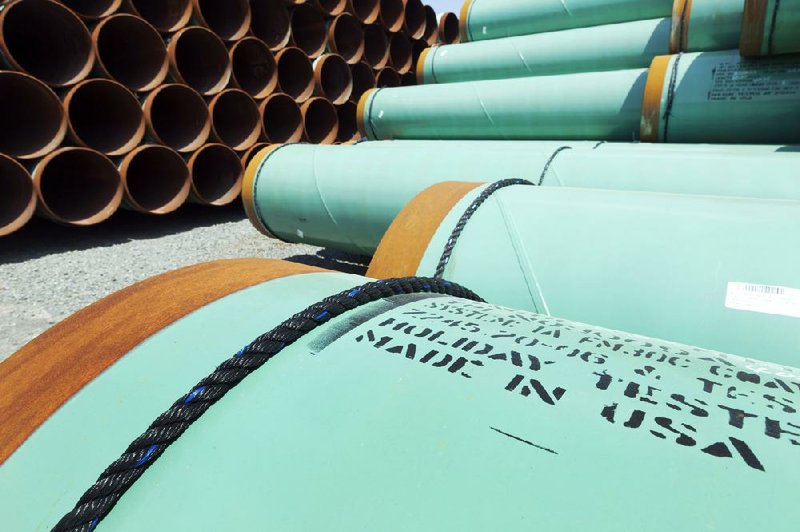WASHINGTON - President Barack Obama’s administration is putting off its decision on the contentious Keystone XL oil pipeline, likely until after the November elections, indefinitely extending its review of the project.
In a surprise announcement Friday as Washington was winding down for Easter, the State Department said eight federal agencies that had until early May to comment on the proposed pipeline will now get more time, but officials declined to say how much.
Officials said the decision will have to wait for the dust to settle in Nebraska, where a judge in February overturned a state law that allowed the pipeline’s path through the state.
“Agencies need additional time based on the uncertainty created by the ongoing litigation in the Nebraska Supreme Court which could ultimately affect the pipeline route,” the State Department said in a statement.
Nebraska’s Supreme Court isn’t expected to hear an appeal to that ruling until September or October, and there could be more legal maneuvering after the high court rules. So Obama will almost surely have until after the November congressional elections to make the final call about whether the pipeline carrying oil from Canada should be built.
A senior State Department official said in a conference call with reporters Friday that the delay was not meant to avoid a decision before the election.
Approving the pipeline before the election would rankle Obama’s allies and donors in the environmental community, but denying it could be politically damaging to vulnerable Democrats running this year in conservative-leaning areas.
“This decision is irresponsible, unnecessary and unacceptable,” said Democratic Sen. Mary Landrieu, who faces a difficult re-election in Louisiana,. The pipeline is to carry crude oil to Gulf Coast refineries. Landrieu said Obama was signaling that a small group can tie up the process in the courts, sacrificing 42,000 jobs and billions in economic activity.
Landrieu is among 11 Democrats who had urged Obama to approve the project by May 31.
Several Republicans joined Landrieu and other Democrats like Sen. Mark Begich of Alaska in immediately condemning the announcement - the latest in a string of delays in a review process that has dragged on for more than five years.
Senate Minority Leader Mitch McConnell, R-Ky., accused Obama of kowtowing to “radical activists” from the environmental community, while House Speaker John Boehner, R-Ohio, called the decision “shameful” and said there were no credible reasons for further delay.
“This job-creating project has cleared every environmental hurdle and overwhelmingly passed the test of public opinion, yet it’s been blocked for more than 2,000 days,” Boehner said in a statement.
But environmental groups fighting the pipeline hailed the delay, arguing that it shows the State Department is taking the arguments against the pipeline seriously.
“This is definitely great news,” said Tiernan Sittenfeld, senior vice president for the League of Conservation Voters. “We are very confident as they continue to examine the issues with the lack of legal route in Nebraska and the terrible climate impacts, at the end of the day the pipeline will be rejected.”
Keystone XL would carry oil from western Canada’s tar sands to refineries on the Texas Gulf Coast. The project requires State Department approval because it crosses an international border. The State Department vowed to move forward with other aspects of its review even while the situation in Nebraska remains in limbo.
“The agency consultation process is not starting over,” the State Department said in a statement.
State Department officials said other U.S. agencies, such as the Environmental Protection Agency, won’t be notified of their new deadline for comment until the legal situation in Nebraska becomes clearer. At the core of the delay is a concern that the legal wrangling could lead to a change in the pipeline’s route that would affect agencies’ assessments, said the officials, who spoke on condition of anonymity because they weren’t authorized to comment.
The White House has insisted that Secretary of State John Kerry is in charge of the process, which involves making a determination about whether the pipeline is in America’s national interest. But Obama is widely expected to make the final call.
Obama has said the pipeline will be deemed not in the U.S. interest if it contributes significantly to increasing carbon dioxide emissions, which many scientists believe contribute to climate change. Environmentalists argue that the oil that’s pulled out of Canada’s tar sands is among the dirtiest on the planet.
The White House declined to comment on the State Department’s announcement, which came on Friday afternoon, when many Americans were observing Good Friday. Sen. Lisa Murkowski, R-Alaska, accused the administration of “a stunning act of political cowardice” by waiting until most Americans would be too busy preparing for Easter or observing the Jewish holiday of Passover to notice the delay.
Obama and environmental groups dispute the notion that the pipeline would create many permanent jobs or have a substantial economic effect, but Obama has refused to say whether he will deny it. The 1,179-mile pipeline would travel through Montana and South Dakota to a hub in Nebraska, where it would connect with existing pipelines to carry more than 800,000 barrels of crude oil a day to refineries in Texas.
In February, a Nebraska judge invalidated legislation that let the governor approve the pipeline’s path. The judge said only the state Public Service Commission - an agency created to take politics out of decisions involving the taking of land for private projects - had that power. His decision has been appealed to the Nebraska Supreme Court.
Both sides have agreed that the case should be expedited, said Dave Domina, an Omaha, Neb., lawyer who represents landowners opposing the pipeline. Assuming no delays, the case could be argued before the court in September or October, he said, with a decision several months later.
“I don’t think it’s reasonable to expect a decision within two months,” Domina said. “It’s a case that involves some complexity.”
Officials in the offices of Nebraska Gov. Dave Heineman and Attorney General Jon Bruning, both Republicans, didn’t immediately respond to requests for comment.
Bold Nebraska, a group opposed to the project, said the state Supreme Court won’t decide the appeal until January, and if the lower court is upheld, TransCanada Corp., which has proposed the pipeline, will need to apply to the Nebraska Public Service Commission. The commission by law has seven months to conduct pipeline reviews.
TransCanada Chief Executive Officer Russ Girling said the company was “extremely disappointed and frustrated” with the latest delay.
This isn’t the first time machinations in Nebraska have delayed a Keystone XL decision. The pipeline’s initial route had to be redrawn to address concerns that it would threaten an aquifer and the Nebraska sandhills, a region of grass-covered dunes used as ranch land.
The pipeline project also has become a proxy for a larger battle between environmental activists and energy advocates over climate change and the future of American energy.
Environmentalists’ hopes that Obama would reject the pipeline were dealt a blow in January when the State Department, in a highly anticipated environmental report, said that building the pipeline would not significantly boost emissions because the oil was likely to find its way to market one way or another.
The State Department also concluded that transporting the oil by rail or truck would have an even worse environmental effect than building the pipeline.
The American Petroleum Institute, a lobbying group for the oil and gas industry, said the latest delay “is not in our national interest” and said studies support building the pipeline. The group said Congress should take action without waiting for Obama.
“It’s a sad day for America’s workers when politics trumps job-creating policy at the White House,” said Jack Gerard, president of the group.
The Natural Resources Defense Council, an environmental group that has garnered the support of 10 former Nobel Peace Prize laureates in opposing Keystone, said it’s the pipeline that isn’t in the public interest and called the delay “the most prudent course of action possible.”
Information for this article was contributed by Dina Cappiello, Josh Lederman, Bradley Klapper, Matthew Lee, Grant Schulte and Charmaine Noronha of The Associated Press and by Jim Snyder, Susan Decker and Brian Wingfield of Bloomberg News.
Front Section, Pages 1 on 04/19/2014

